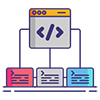Cross Platform App Development

Cross Platform App Development Pros and Cons
Are you thinking about developing an app for multiple platforms? It can be an effective way to reduce expenses while maximizing your reach. Like all other approaches to application development, cross-platform app development has its pros and cons. In this post, we’ll explore them to help you make an informed choice.
Pros of Cross Platform App Development
Let’s start with the advantages, as there are quite a few of them. Cross-platform app development wouldn’t be as popular as it is today if it wasn’t for the multiple benefits it brings not only developers but also companies and users.
1. Helps You Reach a Wider Audience Faster
 People today connect to the internet using a variety of devices, operating systems, web browsers and mobile devices. Cross-platform app development helps you make an app available to everyone, usually faster than if you were to develop separate apps for different platforms. What’s more, it helps you do this while keeping the app design and features uniform and consistent.
People today connect to the internet using a variety of devices, operating systems, web browsers and mobile devices. Cross-platform app development helps you make an app available to everyone, usually faster than if you were to develop separate apps for different platforms. What’s more, it helps you do this while keeping the app design and features uniform and consistent.
2. Speeds Up Development Time for Multiple Apps
 Developing a complex app for mobile devices or the web can take several months or longer. With cross-platform app development, you build the apps using the same essential code, which means that different teams can work on multiple apps at the same time.
Developing a complex app for mobile devices or the web can take several months or longer. With cross-platform app development, you build the apps using the same essential code, which means that different teams can work on multiple apps at the same time.
3. Can Reduce Your Costs
 Cross-platform app development is usually more affordable than building separate apps because a smaller team can do it using a single framework and fewer resources. In other words, cross-platform app development helps you use your money more effectively to maximize the reach of your apps.
Cross-platform app development is usually more affordable than building separate apps because a smaller team can do it using a single framework and fewer resources. In other words, cross-platform app development helps you use your money more effectively to maximize the reach of your apps.
4. Single Code Base Streamlines Development
 Coding a good app involves a lot of testing and bug fixing. Cross-platform app development relies on a single shared code base for all versions of the app, which streamlines the development process and helps coders screen out bugs and fix errors faster.
Coding a good app involves a lot of testing and bug fixing. Cross-platform app development relies on a single shared code base for all versions of the app, which streamlines the development process and helps coders screen out bugs and fix errors faster.
5. Great for BYOD Projects
Companies building internal apps may have a Bring Your Own Device (BYOD) policy in place in which their teams can work on their own personal devices. Cross platform app development is an effective solution to enabling BYOD policies in the workplace while avoiding long development times or high costs.
Cons of Cross Platform App Development
While cross platform app development has a lot going for it, you also need to be aware of its potential drawbacks. This is not necessarily the best approach to web development for all projects. Here’s why.
1. May Lead to App Generalization
 When it comes to building cross-platform apps, developers may have to drop features and generalize an app if one platform has more functionality than another. Cross-platform development doesn’t necessarily encourage the development of the most advanced app, but rather of an app that can run well across different platforms. Therefore, it may not always make the best use of a particular platform’s strength.
When it comes to building cross-platform apps, developers may have to drop features and generalize an app if one platform has more functionality than another. Cross-platform development doesn’t necessarily encourage the development of the most advanced app, but rather of an app that can run well across different platforms. Therefore, it may not always make the best use of a particular platform’s strength.
2. Potential Performance Issues
Cross platform app development cannot always ensure the best possible performance for a specific platform. This is because the codebase and the framework and technology stack it uses focus on compatibility rather than maximizing performance for a specific platform.
3. Slower Integration of New Features
Platforms like iOS or Android constantly roll new changes, but it takes time for cross-platform app development frameworks to integrate these changes. This is why apps built to be cross-platform tend to lag behind native apps in terms of feature update times.
Final Thoughts
Is cross platform app development for you? It depends on your project, your audience, and your aims. If you want to reach as many users as possible, simplify development, and reduce costs, and can generalize your app to make it compatible across platforms that have different features and requirements, then the answer is yes.
Summary of Pro and Cons
Pros
- Helps You Reach a Wider Audience Faster
- Speeds Up Development Time for Multiple Apps
- Can Reduce Your Costs
- Single Code Base Streamlines Development
- Great for BYOD Projects
Cons
- May Lead to App Generalization
- Potential Performance Issues
- Slower Integration of New Features
Additional Cross Platform Resources
- React Native – Create native apps for Android and iOS using React.
- Microsoft Visual Studio Xamarin – Deliver native Android, iOS, and Windows apps with a single shared .NET code base.
- Flutter – Build apps for any screen.
- Ionic – Free and open source, Ionic offers a library of mobile-optimized UI components, gestures, and tools for building fast, highly interactive apps.
- Cordova – Target multiple platforms with one code base, free and open source.
